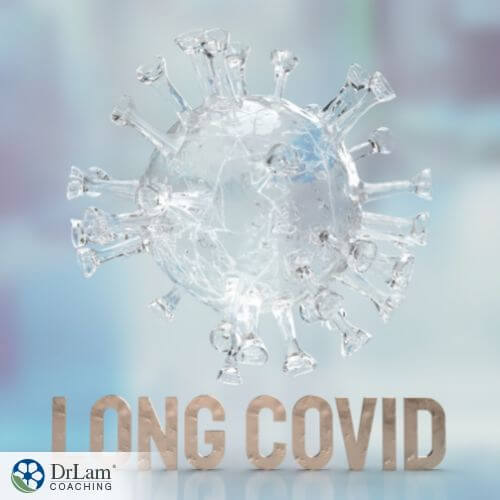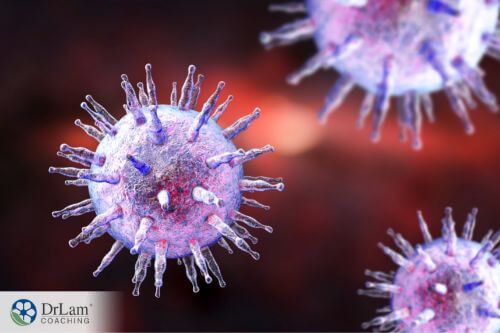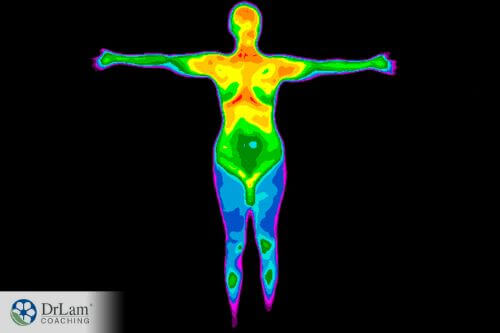 As the lockdowns and stress from the last two years are still fresh in our minds, we’re only just starting to get a glimpse into what long COVID can do. The research on this topic is still young, and a lot more data is needed to better understand the condition. But from what we do know, we have some concerns about how it might affect those who suffer from adrenal fatigue.
As the lockdowns and stress from the last two years are still fresh in our minds, we’re only just starting to get a glimpse into what long COVID can do. The research on this topic is still young, and a lot more data is needed to better understand the condition. But from what we do know, we have some concerns about how it might affect those who suffer from adrenal fatigue.
Long COVID, or what’s also called post-COVID-19 condition or post COVID-19 syndrome, is when you still experience symptoms long after the infection itself has been resolved. For some, these symptoms can be mild and last for a few short weeks. For others, the symptoms can be debilitating and last for months. According to the CDC, the post-COVID-19 condition is when COVID-19-related health issues continue four or more weeks after contracting the virus.
Some of the more common symptoms of this post COVID-19 condition include:
Although it’s normal to experience a period of weakness after an infection has subsided, what makes post COVID-19 syndrome different is how prolonged and comprehensive the condition is. As some have described, it is like you haven’t really recovered. Like the infection has impacted your health and energy levels in a deep and lasting way.
This has been quite the hot topic lately. And so far, there is quite limited data on who is more vulnerable to developing a post COVID-19 condition. There have been cases of young, healthy, and athletic people who contract COVID-19 and go on to develop long-term symptoms.
Some studies indicate that there are a few risk factors that could increase your chances of developing long COVID, and they include the following:
Let’s take a look at these risk factors one by one.
Older age is a risk factor for having an underlying condition as well. With regards to gender, it seems that hormonal changes that women experience, especially perimenopause and menopause, are what make them more likely to develop long COVID.
The viral load can increase the severity of the primary infection by up to four times. Having an underlying condition, such as asthma, lung disease, heart disease, diabetes, and other chronic issues is a big risk factor as well. This is true not only for the long haul symptoms, but also for the severity of the primary infection.
Autoantibodies signify that there could be dysregulation of the immune system. Many autoimmune conditions, where the immune system attacks the body’s own tissues instead of the virus, can be diagnosed by testing for these autoantibodies. One study noted that COVID-19 patients that already have autoantibodies account for 20% of the very serious and even fatal cases of the infection.

The vast majority of the population has EBV. In most people, it lies dormant and doesn’t present symptoms. It can, however, get reactivated. Because it’s a stealth infection, one that the immune system is not able to fully get rid of, a reactivated case of EBV can put a heavy toll on your immune response. It can lead to chronic inflammation and add a lot of stress onto your NeuroEndoMetabolic (NEM) Stress Response.
Dysbiosis is another huge factor when it comes to chronic inflammation. When your gut microbiome is not in balance, the harmful bacteria can outnumber the beneficial ones. In such situations, what ends up happening is that your gut lining gets compromised, creating leaks. These leaks then allow substances into your bloodstream that shouldn’t be there. This then prompts an immune response, causing inflammation. But because the leaks are still present, the cycle continues and the inflammation becomes chronic.
Chronic inflammation is a huge stressor on the NEM. It can also spread to other areas of the body, causing problems there. For example, inflammation that spreads to the skin can cause skin rashes. Inflammation that spreads to the joints can cause joint pain. And inflammation that reaches the brain can cause brain fog, anxiety, depression, and even insomnia.
Many of these are also long COVID symptoms. And many healthcare professionals are theorizing that, indeed, long COVID is a result of the chronic inflammation that comes with the condition. The primary infection created a domino-like effect of different issues that led to the spread of inflammation.
This leads us to the next logical connection: that post COVID-19 syndrome and Adrenal Fatigue Syndrome (AFS) can affect each other. Sometimes quite strongly.
Adrenal Fatigue Syndrome (AFS) is a condition you develop from chronic stress. Chronic stress, whether physical or psychological, overworks your adrenal glands. They have to produce more and more cortisol in order to meet the growing demands. Elevated cortisol levels mark the beginning phases of AFS. But after a while, your adrenals get exhausted and their cortisol output drops. That marks the more advanced stages of AFS.
Symptoms of AFS include fatigue, weight gain, sleep disturbances, brain fog, anxiety, mild depression, hair loss, skin issues, PMS, loss of libido, infertility, hypoglycemia, salt and sugar cravings, heart palpitations, unstable blood pressure, food and drug sensitivities, and lowered immunity.
And because one of the roles of cortisol is to neutralize inflammation and suppress the immune system once they’ve done their jobs, abnormal cortisol levels can affect that process. Chronic inflammation, therefore, can be both a stressor that triggers or worsens AFS as well as a result of AFS.
COVID-19, like any infection, is a stressor on the body. And depending on your risk factors, a stressor like this can either be acute or turn into something more chronic, like post COVID-19 syndrome. If you’re already in a compromised state of health, then it’s more likely that the virus will create a cascade of issues that then put a lot of pressure on your NEM and adrenal glands.
In particular, because COVID-19 seems to induce chronic inflammation in those with dysbiosis and by reactivating EBV, then we can be pretty certain that it can also trigger or worsen AFS. Even more specifically, depending on certain risk factors, COVID-19 will affect certain NEM circuits more than others.
 Your NeuroEndoMetabolic (NEM) Stress Response is your body’s global response to stress. It’s composed of six circuits of organs and systems that work together to fight stress. Those are the Hormone, the Bioenergetics, the Cardionomic, the Neuroaffect, the Inflammation, and the Detoxification circuits. Each of these circuits is composed of three main components, and every two circuits will share one component. That’s why the NEM is a kind of network and behaves as a holistic system.
Your NeuroEndoMetabolic (NEM) Stress Response is your body’s global response to stress. It’s composed of six circuits of organs and systems that work together to fight stress. Those are the Hormone, the Bioenergetics, the Cardionomic, the Neuroaffect, the Inflammation, and the Detoxification circuits. Each of these circuits is composed of three main components, and every two circuits will share one component. That’s why the NEM is a kind of network and behaves as a holistic system.
Your adrenal glands are part of your Hormone and Cardionomic circuits. They are your NEM’s first responders to stress and also the main component involved in the fight or flight response. Your Hormone Circuit is composed of your adrenals, thyroid, and sex organs. Your Cardionomic Circuit is composed of your adrenals, cardiovascular system, and autonomic nervous system (ANS).
The Cardionomic Circuit link is possibly why those with COVID-19 get heart palpitations. Some studies have also shown that cardiovascular risks increase quite dramatically in those that were infected, especially if they went on to develop post COVID-19 syndrome. Although we cannot say that this increase is in any way related to the influence of the adrenal glands, we do know that AFS and NEM dysregulation may make you more susceptible to cardiovascular issues overall.
If you already have heart problems, this risk will likely increase even more. And so, it is imperative for you to not only improve your cardiovascular health, but to also address any other conditions that affect it. If you have AFS, it would a good idea to begin adrenal fatigue recovery as soon as possible. Adrenal fatigue recovery is also very helpful in fixing dysbiosis, another big risk factor, as well as any other underlying chronic issue.
As mentioned, the Hormone Circuit is composed of the adrenals, thyroid, and sex organs. Some studies are suggesting that post COVID-19 syndrome may trigger thyroid problems. Your thyroid is what produces thyroid hormones, which are central to your metabolism. Thyroid problems can manifest as either hyperactivity or hypoactivity, both of which can be challenging.
There has been a lot of speculation around the link between COVID-19 and reproductive health. So far, the data is quite lacking and inconclusive. But what we can say is that imbalanced reproductive hormones, such as during perimenopause and menopause, are a risk factor for developing the longer-term COVID symptoms. Those with AFS and NEM dysregulation also tend to suffer more sex hormone imbalances and reproductive issues.
The Neuroaffect Circuit is composed of your ANS, brain, and microbiome. This is where we begin to really see how the chronic inflammation from COVID-19 infections plays out. Those with dysbiosis are more at risk for developing chronic inflammation. This chronic inflammation can reach the brain and ANS, causing neuroaffect symptoms.
That is one reason why you see so many neurological and psychiatric symptoms in those with adrenal fatigue as well as those with post COVID-19 syndrome. The anxiety, depression, brain fog, and sleep problems all stem from the spread of the inflammation. And it’s also why both AFS recovery and recovery from post COVID-19 syndrome need to include balancing the gut microbiome, fighting inflammation, and rebalancing cortisol levels.
 The last two NEM circuits are quite intimately linked. The Inflammation Circuit is composed of your immune system, your microbiome, and your gut. It is what fights the viruses and other pathogens, then gets rid of any dead and damaged cells in the process. To do that, it requires an optimally functioning Detoxification Circuit.
The last two NEM circuits are quite intimately linked. The Inflammation Circuit is composed of your immune system, your microbiome, and your gut. It is what fights the viruses and other pathogens, then gets rid of any dead and damaged cells in the process. To do that, it requires an optimally functioning Detoxification Circuit.
Your Detoxification Circuit is composed of your liver, interstitium, and immune system. It’s the circuit that helps clean out your system from the toxins, pathogens, and metabolic byproducts that your Inflammation Circuit neutralized. If your Detoxification Circuit is not functioning properly, you’re at risk of rising toxicity and chronic inflammation, and therefore of taking longer to recover from COVID-19. That’s why it makes sense to address these two circuits together.
COVID-19 has been a huge global challenge. We’ve been helping many of our regular AFS clients with the effects of the post COVID-19 condition. And from this work, we’re starting to see a connection between those with a compromised NEM Stress Response and the severity and longevity of COVID-19 symptoms. This may be due to several reasons.
The first is that those with adrenal fatigue and NEM dysregulation have an already weakened immune system. They’re more susceptible to chronic inflammation, dysbiosis, and autoimmunity, which are also COVID-19 risk factors. The second is that many of our AFS clients already have other underlying conditions, like cardiovascular issues, metabolic dysregulation, and thyroid problems. Finally, many of our AFS clients are middle-aged and female.
Even if you have many, or all, of the long COVID risk factors, we’d like to offer you some encouragement. There are many things you can do to improve your outcome. Adrenal fatigue recovery is one, as is rebalancing your microbiome. Reducing your overall inflammation is also important as there are therapies to help teach your immune system to not flare up so easily. If you want to reoxygenate and help circulation, ozone and UV Blood irradiation therapy are also good options for you to talk to an experienced healthcare provider about. If you’d like to talk to us about your unique situation, we’d be happy to give you a free initial consultation and take it from there.
Although more research needs to be conducted, some studies have identified a few risk factors, including age, sex, underlying conditions, and the state of your microbiome. With our clients, we’ve also seen a connection between long COVID and adrenal fatigue, and we think that can be used to your advantage.
